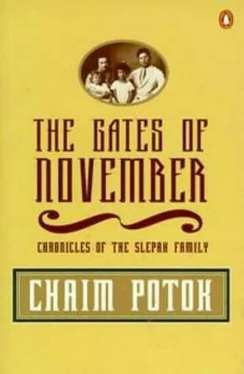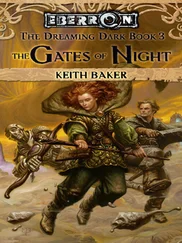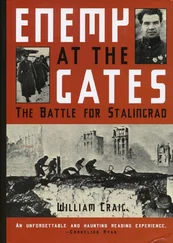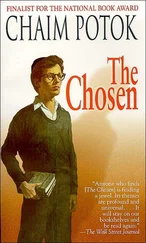Then, in mid-1978, Volodya and Masha Slepak were suddenly arrested by the KGB and brought to trial. Five years later, released from Siberian exile, they returned to Moscow, where they resumed their bleak lives.
My wife said to me then that we ought to visit the Soviet Union and meet some of the people who were risking their lives by their open defiance of that regime. Most of all, she wanted us to meet Volodya and Masha Slepak.

This book is about the Slepak family. It seeks to answer two questions. First: What conditions will drive individuals living in comfort at the very summit of a political system, suddenly to turn against that system and bring ruin down on their lives? And second: Can a single family serve as a microcosm that might shed light on what ultimately happened to all the peoples of the Soviet Union? That was once a land so filled with hope; then a slowly growing skepticism, and a slide into cynicism, disillusionment, alienation, rage, separation, and, in the end, a general disintegration.
What went wrong? Might there be a lesson in that for us all?
I should point out that nothing in this book is invented, save perhaps the configuration we all give to raw facts when we shape them into a narrative. The conversations in these pages have been set down precisely as they were imparted to me by the Slepaks, with only the very lightest of occasional touches for purposes of style and clarity. Throughout, the intent has been to present true events, to add them to the record of this century, for the future to ponder.
I wish to express my thanks to Leonard Gold and Ruth A. Carr of the New York Public Library for their help, as well as to Theodore Comet of the Joint Distribution Committee, Bert Siegel of the Philadelphia Jewish Community Relations Council, and the staff of Gratz College Library in Philadelphia. Thanks also to Owen Laster, my agent, and David Schlossberg, who were the first to suggest that I might be interested in this story, and to Dan and Sheila Segal, Eileen Sussman, and Connie and Joseph Smukler, whose early involvement with many of the Russians in this book edged me into the world of the Soviet Union and its Jews.
Thanks are also due the students in my 1992 Benjamin Franklin Honors Seminar at the University of Pennsylvania. Their keen minds and respectful interest-the awe on their faces the day they met Volodya Slepak in my home!-helped me realize the significance of this subject even to the young and gave me the impetus to move this book along at a crucial period in its development.
To my wife, Adena, I owe boundless gratitude. This was an especially difficult work: the volatile course of events in Russia has resulted in a dramatic lowering of the temperature on the subject of Russian Jewry. Was there anything about the Slepak story that was still worth telling? Her gentle persuasions, perceptive reading, and patient listening helped immeasurably to bring the book to life. And I conclude with words of deepest appreciation to my editor and friend Robert Gottlieb. For decades he has given me the keenest of readerly eyes, the most perceptive of editorial judgments. I am fortunate, indeed, to have Adena and Bob as an intrinsic part of my life.
Prologue A Meeting in Moscow
On a Thursday evening in the first week of January 1985, Adena and I landed in a snowstorm at Sheremetevo Airport in Moscow. Early the next morning we left the humid warmth of our hotel and Adena slipped into a telephone booth on the street and dialed a number, while I waited outside in the bitter cold. After a moment or two I heard her say, “Hello, my husband and I are from Philadelphia. We’re in Moscow, and we’d like to meet you.” She did not give our names. She said only, “My husband and I…” The man at the other end told her briefly which Metro to take, how long the ride would last, and where he would meet us.
Adena and I do not idly travel about on the Jewish Sabbath, which begins on Friday at sundown. But before setting out on our journey to the Soviet Union, we had resolved that we would behave there as if we had entered a zone of emergency, a landscape of combat; whenever necessary, we would transgress religious laws. In wintry Moscow, daylight arrived around nine in the morning and was entirely gone by about three in the afternoon. Volodya Slepak worked and would be unable to see us until after six o’clock. And that Friday night was the only time we could meet with him and his wife, for there were many others to see, and our remaining nights in Moscow were accounted for. That was our choice: Keep the Sabbath and miss the Slepaks, or break the Sabbath and meet the Slepaks.
That evening we left the hotel and walked on snow and ice past St. Basils Cathedral and the Kremlin Passage. A street or so beyond Lenin’s Tomb, we turned into the Marx Prospekt Metro station. The train was quiet, clean, crowded. In our gray down coats, insulated boots, and colored scarves, we were clearly Americans. This was the Reagan era; the wild American cowboy president was threatening the world with nuclear war. Passengers glared at us with unconcealed hostility. We traveled for about a half hour.
The train pulled into our station. We walked with others along the platform and began to hang back, letting the crowd move past us. Soon we were the only ones there.
The well-lighted station had cream-colored tile walls, bright and clean. The air, smelling of cold, damp earth, echoed with vague and distant sounds: an eerie pinging of metal, the skitterings of unseen creatures.
Up ahead Volodya Slepak suddenly stepped out from behind a pillar and moved slowly toward us, his face familiar from the many photographs we had seen of him. The bright lights of the Metro revealed his sharp eyes and large nose and broad smile and graying Amish-style beard. He wore a dark coat and a fur cap with earflaps. Bearded, stocky, of medium height. He said in a deep, throaty voice, “Shalom aleichem,” the traditional Hebrew greeting, meaning “Peace be with you.” Startling to hear Hebrew in the Moscow Metro.
Adena and I gave the traditional response: “Aleichem shalom.”
We shook hands.
“Please come with me.”
We followed him through the station and up a stairway and out into the cold night.
Snow blew in waves through the streets. Beads of frozen moisture formed on my beard. I could barely see through my glasses.
He walked between us along the shoveled paths and plowed streets. “Probably you do not like our Russian weather,” he said. “Is this your usual winter?” Adena asked.
“Perhaps not so usual,” he said. “But it is not so very bad in Moscow. Other places it is terrible.”
I told him the only time I’d ever felt this cold was during my sixteen months with the American Army in Korea.
“Ah, you were a soldier in Korea?”
“We got the winds from Siberia.”
“Ah, yes. I know very well those winds.”
We walked on in silence, carefully navigating tall banks of snow. He was taking us to the apartment of his wife’s brother and sister-in-law. Not a soul visible anywhere in the white windblown night. Massive apartment houses on both sides of the street. Soft yellow lights in windows. The dry, squeaking sounds of our boots on the wind-scoured snow. Vague lights approaching slowly and then a car gliding past us, no headlights, only its dims glowing, the only car we’d seen since leaving the Metro.
I asked, “Why do they drive without headlights?” “To save batteries.” “Isn’t it dangerous?” “Of course.”
I asked what the accident rate was in Russia.
“The same as in America, about fifty thousand fatalities a year-but we have one-tenth your number of vehicles. Now, please, we go this way.”
Читать дальше













